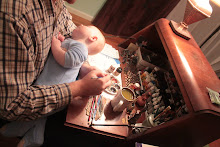 |
| Tyrus, picture from GW (mine still being in a box) |
Leaving out psykers for now, think about a range, from Gideon to Tyrus, behinds the scenes string puller who relies on a combat team for action, to in your face power armored brute. Each has a range of personal combat power, from the feeble old woman who investigates through books and agents, through power armored chap who burns and punches his way to what he wants. Each of these supplements their skills with a retinue, and probably more interestingly for a tabletop game, augments their personal power with the combat power of the retinue.
Not retinue in the sense of all the forces they could muster, because Inquisitor Lords and older inquisitors often have a lot of resources and allies to call on, but retinues in the sense of the core group that an inquisitor would take to meet another inquisitor... or possibly to raid another inquisitor's domicile in a smash and grab raid. In either case, it seems like an inquisitor is trying to reach a certain level of power to bring to bear on a situation, and the physically frail one is going to bring more firepower to compensate for their frailty, and a powerful individual is going to feel more comfortable without bringing an indentured space marine with them. Both are perhapes equally likely to call in powerful allies for expected battles.
Psykers confuse things a bit, but you could see it as being part of the same scheme, where powerful individuals need to augment their power less (and perhaps bring more physical operatives), while weaker individuals need to bring out the stronger assistants (such as a psyker pet).
In any case, it seems like the "medium" Inquisitors, i.e. those who do some of their own investigations, but are more subtle than the power armored burninators, might actually have the more interesting retinues. They might have some powerful band members, but could also feel comfortable including more savants or researchers of moderate to negligible combat utility. In my own (slow) work, I am working on creating a bit of a range in the power of inquisitors and supporters, but it keeps hovering around the middle, where I think the interest really lies.
What do you think?
Related to these musings, I have set up a new Pinterest board that features Inquisitorial Warbands. it is pretty empty now, but I am trying to round up good shots of all the various inquisitors with their retinues.


6 comments:
I have for a long time wanted to write an article regarding how I believe that an Inquisitor's retinue represents their psyche in a way - this is especially the case in the Eisenhorn trilogy, I believe. Losing Aemos (or gaining Cherubael) have an impact on Eisenhorn's personality, as well as on his methods of conducting his work.
That is a good point. To a certain extent, the retinue of an inqusitor reflects their personality and thinking, but
Then again, consider Fischig. The mind of an inquisitor is strong, otherwise they would have another job, and it is very hard for external parties to change them.
Well, I would consider Fischig to be the "ego" (in a Freudian sense), acting as a moral compass and a limiter on Eisenhorn's darker desires. I suppose Cherubael might well be the "id", the desire and the ultimate power to do whatever he wants.
Fischig acts as a moral compass, resolute and steadfast, always willing to contradict his master. I often see Priest archetypes as fulfilling the same role, and like the idea of an obviously radical Inquisitor keeping a priest along for such a reason - because they can try to keep their master on the straight and narrow. Indeed, perhaps the priest is well aware of what their master is doing, but believes that they can be "redeemed".
Eisenhorn, I think, values that willingness to be challenged - or he does until Cherubael overpowers him. As Eisenhorn descends into radicalism, he sends Fischig away - to me, that seems to represent how to show how the followers an Inquisitor keeps with him represent his psyche.
I don't know, I always thought of Fischig's "moral compass" to be more in his own head than something that Eisenhorn actually listens to. After all, Eisenhorn is the one who has had all the training on seeing where the knife edge is, and is the only one who is always in full possession of the facts (even those about possession)
In any case, having a balanced retinue is a good idea, both for combat, and for varity of opinions.
An enjoyable read both the article and the discussion developing in your comments. I not certain of the psychological ramifications but believe that a good retinue is composed of "pieces" of their parent inquisitor. I don't consider game ramifications in what I'm doing but in creating a story based construct I have been treating them as avatars or aspects.
The inquisitor himself is a more carefully considered and complex character while the members of the retinue can comfortably be defined initially as simple archetypes. Their own quirks are derivative of their master.
Everything returns to Eisenhorn and the philosophy is best illustrated with Ravenor who due to his limitations is often in the position of enforcing his own presence as a puppet-master inhabiting their physical forms. They are the manifestation of his will.
Thanks Horridperson. I agree, that interesting models or character archetypes should certainly come before considerations of combat power when building the little guys.
It also seems that you could define a inqusitor by his retinue, so much so, that it might make sense to build the retinue first if you do not already have a strong sense of the inqusitor.
Post a Comment